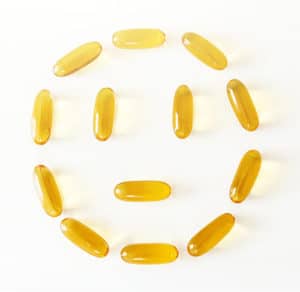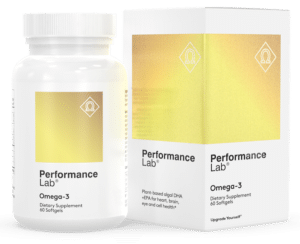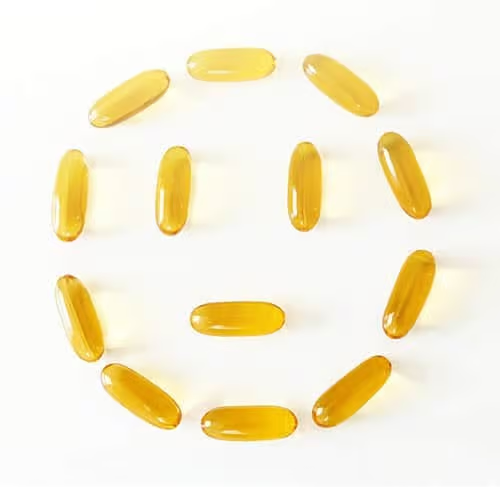Table of Contents
Key Takeaways
- Omega-3s (DHA and EPA) are crucial for cognition, heart health, relieving depression, reducing inflammation, and promoting learning and memory.
- Many people are deficient in Omega-3s due to imbalanced diets rich in omega-6 fatty acids.
- To ensure effective absorption, Omega-3 supplements should be taken with a fatty meal.
- Signs of Omega-3 deficiency include brittle nails, dry skin, fatigue, poor concentration, joint pain, and emotional issues like depression or anxiety.
- The Omega-3 Index test can assess Omega-3 levels, and a typical effective nootropic dosage at 1000 mg DHA per day can help raise deficient levels.
Omega-3s are critical for optimal cognition and overall good health. The Omega-3s DHA and EPA are essential for heart health, relieving depression, reducing inflammation, learning and memory, and repairing and growing new brain cells.
But if you added fish oil or an Omega-3 supplement like the new Performance Lab® Omega-3 to your daily nootropic stack, how long does it take for Omega-3 to work? How soon can you experience these health benefits?
In this post you’ll learn what Omega-3s are, what happens when you start taking an Omega-3 supplement, what it feels like, and get a clear idea about how long it takes for an Omega-3 supplement to work.
What are Omega-3s?
Omega-3 is an essential fatty acid. It’s “essential” because omega-3 is critical for optimal brain and overall health.
Omega-3s come in three types: α-Linolenic acid (ALA), Eicosapentaenoic acid (EPA), and Docosahexaenoic acid (DHA).
Alpha-Linolenic Acid fatty acids come from plants. And EPA and DHA are found primarily in oily fish like salmon, herring, mackerel, anchovies, menhaden, and sardines. Which get their Omega-3s in the wild from algae.
Your body cannot produce this type of fat. Which means that to maintain healthy levels of omega-3s, you need to get it from food.
But instead of getting adequate amounts of omega-3s, most people continue to be deficient.
Here’s why …
 Why you may be Omega-3 deficient
Why you may be Omega-3 deficient
You could be low in Omega-3s because you’re not eating enough seafood high in EPA and DHA. Or the Omega-3 supplement you are using is not being absorbed by your digestive system.
Let’s examine these two reasons in a little more detail for clarity.
The biggest problem is our Western diet is loaded with omega-6 fatty acids. From processed foods, and cooking oils like palm, canola, soybean, sunflower and safflower oil.
Our ancestors evolved on a diet with a ratio of omega-6 to omega-3 essential fatty acids with a ratio of 1:1.
Our modern diet on the other hand maintains an unhealthy balance of omega-6 to omega-3 with a ratio of 16:1.
This unhealthy fatty acid ratio may account for many of the diseases we see in our society. Including heart disease, cancer, osteoporosis, and inflammatory and autoimmune diseases.[i]
Do your best to avoid processed foods and unhealthy cooking oils loaded with omega-6 fatty acids.
There is no need to eliminate them altogether. But instead, increase your Omega-3 fatty acid intake by eating seafoods high in DHA and EPA. Or use an Omega-3 supplement such as the Performance Lab® Omega-3 every day.
A diet higher in omega-3s provides an anti-inflammatory effect by suppressing interleukin 1beta (IL-1beta), tumor necrosis factor-alpha (TN-F-alpha) and interleukin-6 (IL-6). Something omega-6 fatty acids cannot do.
Why your Omega-3 isn’t working
Another reason you could be Omega-3 deficient is you’re not eating enough healthy fat! Even if you are using a daily supplement.
 Omega-3 fatty acids are only absorbed and used by your system if taken with a fatty meal.
Omega-3 fatty acids are only absorbed and used by your system if taken with a fatty meal.
You need enough fat to release bile salts that emulsify, and pancreatic enzymes that digest omega-3-containing lipids in your intestine.[ii]
If you’ve been following the advice offered by mainstream medicine to eat a low-fat diet, you should know it’s bad advice.
Because without these healthy fats in your diet, you’re not getting the benefit of any of the fat-soluble supplements you are currently using.
Those fat-soluble supplements, including Omega-3s, never make it through your digestive system. For the reasons explained above.
And you excrete your fish oil, Omega-3, or DHA supplement unused. Never experiencing its benefit.[iii]
If this is you I encourage you to revisit this faulty advice. And add some healthy fats back to your diet.
Because you’ll be amazed at how good you feel. Once your body and brain again have access to healthy fats, you start getting all the benefits offered by the fat-soluble vitamins, minerals, and Omega-3s.
The fat-soluble nutrients that require fat for digestion and transport so your body and brain can use them.
Signs that you are Omega-3 deficient
If you have brittle nails, lifeless looking hair, dry skin, fatigue, poor concentration, joint pain, or suffer from insomnia it could be a sign of omega-3 deficiency.
 Other signs of Omega-3 deficiency include problems with attention, learning and memory. And depression, anxiety, aggressive behavior, anger, or suicidal thoughts have all been linked to Omega-3 deficiency.
Other signs of Omega-3 deficiency include problems with attention, learning and memory. And depression, anxiety, aggressive behavior, anger, or suicidal thoughts have all been linked to Omega-3 deficiency.
Now, I’m NOT saying that as soon as you start following an Omega-3 supplementation regimen that you’ll suddenly be cured all your ills. There is no one-pill solution.
But using a high-quality Omega-3 or DHA supplement every day at recommended dosages could start you on the path to feeling better.
How to test your Omega-3 levels
Ask your doctor or go to a local lab and request an Omega-3 Index test to better understand your status.
The Omega-3 Index is a blood test that measures the percentage of Omega-3 fatty acids (DHA and EPA) in red blood cell membranes.
For example, if you have 64 fatty acids in a cell membrane and 3 are DHA and EPA, then you have an Omega-3 Index of 4.6%.
The Omega-3 Index Reference Range is 2.90 – 12.90%.
Omega-3 Index – 8% or higher – low risk zone
Omega-3 Index – 6% or less – average risk zone
Omega-3 Index – 4% or less – high risk zone[iv]
How to increase your Omega-3 levels
If you are Omega-3 deficient the only way to raise your Index score is by supplementing with DHA and EPA.
 ALA found in plants like flaxseed or chia have NO IMPACT on your Omega-3 Index. And provide extraordinarily little health benefit. You may have seen claims that flaxseed oil is a miracle drug for skin hydration, and replacing the oils in your skin may make it appear healthier. But do nothing for optimal brain health.
ALA found in plants like flaxseed or chia have NO IMPACT on your Omega-3 Index. And provide extraordinarily little health benefit. You may have seen claims that flaxseed oil is a miracle drug for skin hydration, and replacing the oils in your skin may make it appear healthier. But do nothing for optimal brain health.
ALA can be converted into EPA and then to DHA. But the conversion is limited to your liver and is extremely limited.[v]
Consuming DHA and EPA directly from foods rich in Omega-3s and/or nootropic supplements is the only practical way to increase these fatty acids in your body.[vi]
Wild caught salmon and farmed salmon supply more DHA and EPA per 100 g serving that other forms of seafood. Ranging from 717 – 1533 mg/100 g according to one study.[vii]
The most consistent method of raising your Omega-3 Index levels is by using an Omega-3 supplement distilled from fish oil or algae.
Omega-3 supplements are available in several different forms including natural triglycerides, free fatty acids, ethyl esters, re-esterified triglycerides, and phospholipids.
Studies show one of the best and quickest ways to raise your DHA and EPA levels are by using re-esterified triglycerides (124%) compared to natural fish oil. With a supplement like Performance Lab® Omega-3.
Bioavailability of ethyl esters was the worst (73%). Free fatty acids and natural triglycerides were about the same as using natural fish oil (91%).[viii]
Another set of studies show Krill oil as the phospholipid form of DHA & EPA, where peak levels were measured in blood at the 24-hour mark.
Krill oil also showed better bioavailability than re-esterified triglycerides and ethyl esters falling far behind.[ix]
 How much Omega-3 should I take daily?
How much Omega-3 should I take daily?
The recommended daily dosage of Omega-3s depend on your age, sex, and health status.
Health authorities around the world have released dosage guidelines for Omega-3s. But they vary from authority to authority.
The majority of my research has been in brain health and optimization. And I have concluded, based on peer-reviewed clinical studies, that the most effective nootropic dosage is 1000 mg DHA per day.
Your system does require EPA along with DHA. And you’ll find most DHA supplements also contain effective, but smaller doses of EPA as well.
Taking too much fish oil may weaken the immune system over time. While you would need to take a massive amount of fresh fish oil for this to be a problem, how much fish oil to take differs from person to person.
The safest way to decide how much Omega-3 is right for you is to get tested. And then base your dosage on your Omega-3 Index score.
If you need to raise your levels, take a higher dose of DHA and EPA until you’re in the “no risk zone”.
 Final note on dosage is to be aware that Omega-3 dosage on the front of a supplement label can be widely different than how much DHA and EPA is in each gelcap. Make sure you check the ‘Supplement Facts’ label before you buy the supplement.
Final note on dosage is to be aware that Omega-3 dosage on the front of a supplement label can be widely different than how much DHA and EPA is in each gelcap. Make sure you check the ‘Supplement Facts’ label before you buy the supplement.
And fresh is best. Because fish oil quickly oxidizes and oxidative stress from using a ‘spoiled’ fish oil supplement is bad for body and brain.[x]
If it smells ‘fishy’ put it back on the shelf. Or throw it out. When it comes to Omega-3 and fish oil supplements the old saying ‘you get what you pay for’ holds true.
I higly recommend: Performance Lab® Omega-3
Frequently Asked Questions
How long does it take for omega 3 to work for anxiety?
The effects of omega-3 on anxiety can vary significantly depending on several factors such as individual biochemistry, dosage, and the severity and cause of the anxiety. On average, however, it might take several weeks to a few months to notice improvements in anxiety symptoms after starting an omega-3 supplementation regimen.
What are the symptoms of severe omega-3 deficiency?
Severe omega-3 deficiency may present a variety of symptoms. These include dry skin, poor memory or cognitive function, mood swings or depression, poor circulation, and increased susceptibility to illness due to immune dysfunction. It’s crucial to consult with a healthcare professional if you suspect you may be experiencing an omega-3 deficiency.
Is it better to take omega-3 in the morning or at night?
There isn’t a universally agreed-upon best time to take omega-3 supplements, as it can depend on individual factors such as digestive health and personal routines. However, some people find it beneficial to take them in the morning with food to help with absorption, while others prefer taking them at night because certain omega-3 supplements can cause mild gastrointestinal discomfort that could be less noticeable during sleep.
How long do omega-3 fish oil capsules last?
The shelf life of omega-3 fish oil capsules can depend on factors such as the specific brand, the manufacturing process, and how the capsules are stored. Generally, a sealed bottle of omega-3 fish oil capsules can last for up to two years when stored in a cool, dark place. It’s important to always check the expiration date on the bottle and to discard any supplements that have expired or have a rancid smell.
What is the best vegan omega-3 supplement?
The best vegan omega-3 supplement can vary based on individual needs and preferences. However, algae-based supplements are a popular choice as they contain both EPA and DHA, two important types of omega-3 fatty acids. Performance Lab Omega-3 is known for their high-quality vegan omega-3 supplements. Remember to consult with your healthcare provider if you are uncertain about starting any new supplement regimen.
Are fish oil supplements a good option to get my Omega-3s?
Did you know fish do not produce Omega-3s? Instead, fish and other sea life get Omega-s from eating phytoplankton that consumed microalgae. And they then accumulate the omega-3s in their tissues. I have found that most Omega-3 dietary supplements do not contain enough (docosahexaenoic acid) DHA to be used for their nootropic value. And I have not seen a fish oil supplement yet that contains adequate amounts of DHA. Instead, you may want to consider getting your Omega-3s daily from a supplement sourced directly from marine algae. My favorite is Performance Lab® Omega-3 which is made from life’s™ OMEGA 60.
The bottom-line for Omega-3s
 Omega-3s make it into your bloodstream within 3 – 4 hours after taking the supplement. And it takes about 24 hours for Omega-3 levels of DHA and EPA to saturate red blood cell membranes after you take the supplement.
Omega-3s make it into your bloodstream within 3 – 4 hours after taking the supplement. And it takes about 24 hours for Omega-3 levels of DHA and EPA to saturate red blood cell membranes after you take the supplement.
But it can take days or even weeks of daily supplementation with Omega-3 to raise your Omega-3 Index score.
Most health professionals suggest not to exceed 4,000 mg Omega-3s per day. But chances are you don’t need that much Omega-3.
Unless you’re treating a specific health issue, it’s safe to use a supplement like the new Performance Lab® Omega-3 which contains 540 mg DHA with 270 mg EPA per day. For optimal brain health. And whole-body optimization with Omega-3 fatty acids.







Join The Discussion - 41 comments
Mike Baker
June 12, 2023
Hello David,
I just recently started experimenting with nootropics and my question to you is that I believe Bacopa is giving me indigestion and bowel issues. Is there a certain type of Bacopa that is effective that may be easier on my system or even perhaps eating something particular with it. I have been taking it on a relatively empty stomach.
David Tomen
June 12, 2023
Mike, there is only what “type” of Bacopa Monnieri. If it’s another it ain’t Bacopa. I make that distinction because there is a lot of adulteration going on in this industry. Esp. when a herb like Bacopa Monnieri becomes popular. And dishonest companies will substitute another herb in the same “family” of herbs. Or fill the capsule with something else altogether.
Try taking it with food. If that doesn’t help then Bacopa Monnieri is the wrong supplement for you.
Tania
January 18, 2023
Hi
Sorry for my english. I saw a video that shows omega 3 open capsule of the brand Now dissolving styrofoam, saying that is very harmful to consume the supplement. I heard also about other brands doing the same, so I made the experiment myself and yes it dissolved a glass or styrofoam very quickly. If it is true that can harm us?
Thank you.
David Tomen
January 25, 2023
Tania, don’t believe everything you see on the internet. Please. NOW Supplements make good products and they have a robust testing program to ensure you are getting what it says on the label. But that does not mean that I would recommend ALL of their supplements. There are better choices for getting your required daily dose of DHA including the Omega-3 I recommend above.
Kyle
October 9, 2023
this is mostly just because of the styrofoam being soluble in the oils, also since both the omega-Xs and the styrofoam are nonpolar oils it’s basically just like pouring water on cotton candy. nothing too crazy or dangerous to you, reputable branding is still a must though!
Raman
December 24, 2022
How much fat do you need to ingest to make DHA-EPA (and B12, D3) soluble?
Is one spoon of coconut oil enough for it to get digested?
I’m personally trying to avoid and reduce meat and dairy, since they don’t bode well for my digestion.
David Tomen
December 26, 2022
Raman, my experience for the well over a decade has been using one tablespoon of unrefined coconut oil to ensure digestion of any fat-soluble ingredients works very well. That includes all the fat-soluble ingredients in my stack including DHA (Omega-3s).
David N.
March 25, 2023
David, with regard to consuming *high quality fats*, alongside fat soluble supplements (such as DHA / EPA Omega 3’s) in order to optimize the nutritional benefits, do you think that consuming a tablespoon or more of high quality butter would be also be OK / fully sufficient? Instead of coconut oil, that is.
For example: a person has convenient access to good quality butter (from pasture raised or grass fed cows, organic and small batch production methods, etc.), but momentarily does not have convenient access to coconut oil? Would butter, with a high enough fat content, be an OK substitute?
David Tomen
March 31, 2023
David, absolutely butter is an option.
Luca
June 6, 2022
Hi David! My capsules contains double EPA in comparison to DHA.
So in 4 1000mg capsules daily I get:
– 1000mg DHA
– 2000mg EPA
I’m 21 year old male, Can I ruin my health from this much EPA?
David Tomen
June 6, 2022
Luca, you’ll not “ruin your health” with that ratio. But I highly recommend finding a better DHA supplement with the correct ratio once you are done with what you have.
Rafael
March 10, 2022
Hi I bought here in Shanghai your Omega 3.
I thought it was fake because you would expect in a product health-related, and also quite price, to have a shield to help conservation between the lid and the product.
Could you please comment on that?
After I checked your QR authenticity system, well done for that.
Normally here in China fake products for example fake toothpaste don’t have that extra aluminium shield.
David Tomen
March 10, 2022
Rafael, every Performance Lab supplement has a safety seal over the mouth of the bottle before the cap is put on. Where did you purchase your Performance Lab Omega-3 from?
Shaun
September 21, 2021
I just bought a expensive fish oil product, with co2 extraction.
But 30 minutes later i got a burp that tasted like fish, is that normal or is it a sign of a bad product?
The product is Minami Morepa Plus.
And if i get fishburps so fast, i think it dissolves in my stomach, does the stomach acid damage the omega 3 fats?
David Tomen
September 21, 2021
Shaun, it is not normal. There are a ton of bad fish oil and Omega-3 supplements on the market. It’s what happens when something becomes popular and everyone and his brother decides to sell fish oil supplements.
And this is why I often recommend specific products because I’ve done the research and recommend what I choose to use myself.
Shaun
September 22, 2021
What do you recommend for me?
Does the omega 3 in algae oil spoil?
I cannot order mindlab pro because i live in the Netherlands.
I wanna use fish oil specifically for depression, cognitive function is a extra but i use it for depression, and ive read that EPA is more effective for depression specifically and DHA for cognitive function etc.
What do you recommend for me?
Thank you!
David Tomen
September 22, 2021
Shaun, any Omega-3 can be rancid if it is not manufactured properly or stored properly. Including those made from algae.
Your brain needs 900 – 1,000 mg per day of DHA. Most DHA supplements also include half that of EPA which will help with depression. But if you do not support brain cell membranes with enough DHA it’ll be much more difficult to take care of your depression no matter what you use.
I was not aware that Performance Lab and Mind Lab Pro did not ship to the Netherlands. Because it does mention on the FAQ page that they ship there.